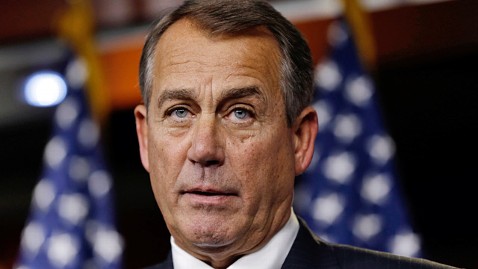John Boehner Re-Elected House Speaker

(Image Credit: Jacquelyn Martin/AP Photo)
Updated at 2:31 p.m. ET
Rep. John Boehner was elected to a second term as House speaker today. But the vote for wasn't without drama.
Nine Republicans voted against Boehner in support of another candidate. Majority Leader Eric Cantor of Virginia received three votes, former Florida Rep. Allen West of Florida received two votes, Rep. Justin Amash of Michigan received one vote and Rep. Raul Labrador of Idaho received one vote. Rep. Jim Jordan of Ohio and David Walker, the former U.S. comptroller general, also received one vote each.
Nancy Pelosi, the Democratic leader and former speaker, took second place, receiving the support of 192 members of her caucus, behind Boehner's 220.
Before taking the oath of office, Boehner delivered remarks to the House chamber, calling the display of democracy "an interlude for reflection, a glimpse of old truths."
"To our new members and their families, welcome. You are likely feeling awestruck right about now. History runs through here, and now you are among a select few to share in this privilege," Boehner told the 113 th Congress. "For those who are returning, who have walked these aisles before, maybe it's time we feel awestruck again."
Boehner reminded members that each member-elect takes the same oath of office, that "makes no mention of party, faction, or title" and "contains no reference to agendas or platforms - only to the Constitution."
Boehner then drew upon his Catholic faith, talking about the temptation to "invoke the assistance of our Heavenly Father" in the oath of office.
"This covenant makes us servants of posterity. It calls us to refuse the pull of passing interests and follow the fixed star of a more perfect union," he said. "We are sent here not to be something, but to do something; to do the right thing. It's a big job, and it comes with big challenges."
As he prepares for a second term as speaker, Boehner said that "government has built up too much debt" and he noted that the U.S. economy "is not producing enough jobs."
After enduring a bumpy ride during the "fiscal cliff" negotiations and watching 151 members of his conference vote against the deal he supported, rumors had swirled across Capitol Hill Wednesday that Boehner might resign as speaker.
Boehner's speakership seemed to be threatened even further when Republicans representing states hit hardest by Hurricane Sandy mounted a revolt after the Ohio congressman denied a vote on legislation to direct relief to the region. Reporters covering the Capitol collectively wondered whether an effort to unseat Boehner was in the works behind the scenes.
Hoping to end the buzz of a coup, Boehner spokesman Michael Steel fired off a crisp email Wednesday, "Rep. Boehner expects to be elected Speaker tomorrow."
Boehner, 63, set up a meeting Wednesday with the angered Sandy Republicans, many who expressed uncertainty about whether they would support Boehner for another term as speaker. But after the meeting, it was clear that Boehner had regained their faith.
Rep. Pete King, a New York Republican incensed that the speaker had delayed action on Sandy aid, emerged from the speaker's office and told reporters he would still support the speaker.
"All I care about is my constituents, the constituents of New York and New Jersey who are absolutely devastated," King said. "Clearly, the speaker responded."
Rep. Michael Grimm, another angered New York Republican, echoed the sentiment. "I will vote for Speaker Boehner," he said.
Grimm and King ultimately supported Boehner.
House Republican Conference Chairman Cathy McMorris Rodgers, the top Republican woman in the House, nominated Boehner for another term as speaker, encouraging her colleagues to support their leader and arguing a vote for him was a vote to "not kick the can down the road."
"This is a popular speaker. There's no plausible alternative in my opinion," Rep. Tom Cole, R-Okla., told reporters after a Republican organizational meeting Wednesday evening. "He deserves to be re-elected and he will be re-elected."
The speaker is elected by a simple majority of all members-elect casting a ballot. Assuming all 433 members of the House vote, (there are two open seats), Boehner needed at least 217 votes to lock up another term as speaker. With 233 Republicans in the House this term, 17 Republicans would have had to vote for someone else in order to send the question to a second ballot.
There was a small minority of the GOP conference that was looking for other options. Rep. Amash, a conservative freshman angry at Boehner after he was booted from the House Budget Committee, refused to endorse Boehner for a second term.
"I haven't made a decision on what to do yet," Amash, R-Mich., said Wednesday night. "I still haven't seen the changes I want to see."
Amash ultimately voted for Labrador.
Even though speaker of the House is second in the presidential line of succession, the Constitution does not require that the position be held by a member of Congress. That meant some frustrated Democrats and Republicans voted for non-members such as Colin Powell and former Comptroller General Walker.
Rep. Cole said he does not believe the speaker's power was diminished after the "fiscal cliff" vote, but the upcoming battle on the next set of legislative imperatives will be critical to re-establishing his clout throughout the Capitol.
"John Boehner is a very strong and very capable speaker and he's got a lot of friends and a lot of respect from this conference," Cole said.
"The next 90 days is a really important period for the Republican conference because it's a period where we think that we can fight, and win and re-establish our unity."